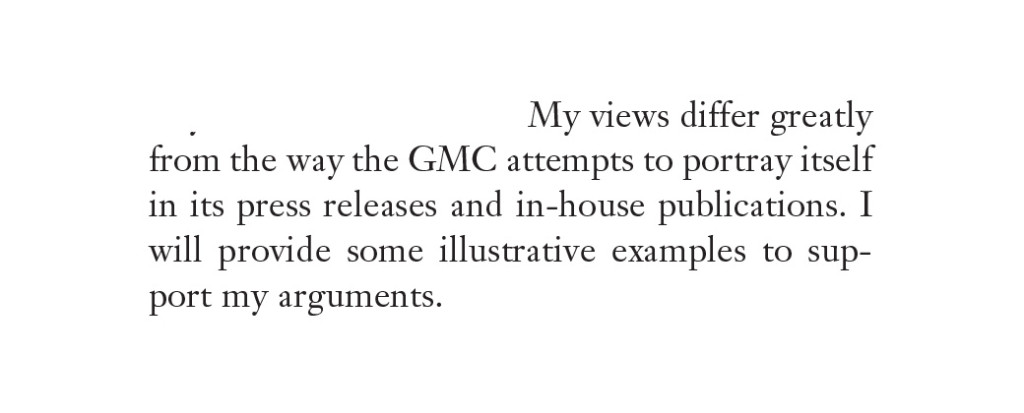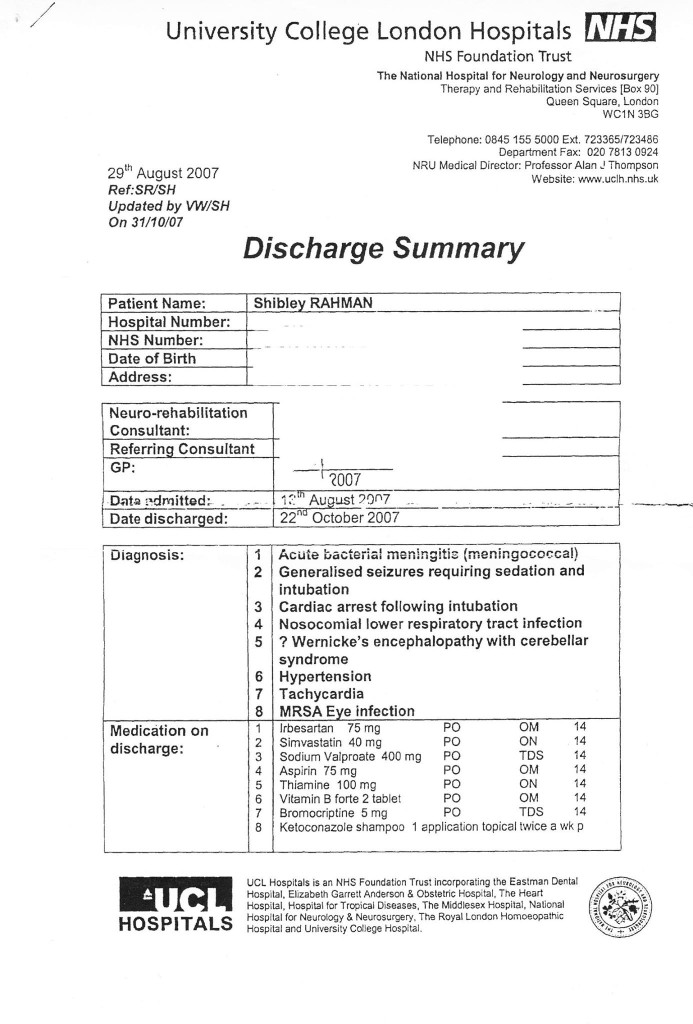Home » Posts tagged 'suicide'
Tag Archives: suicide
I can see why some Doctors would be driven to suicide. I was mentally ill, and felt the same with the GMC FTP.
At least 96 doctors have died while facing a fitness-to-practise investigation from the General Medical Council since 2004, though it is not clear how many of these cases were suicide.
I can understand exactly how this has happened.
I had a prolonged GMC investigation between 2004 and 2006. At no point during this process was I told when then this mentally arduous process would come to an end.
I think now, seven years into recovery, that there by the grace of God go I.
The media have a remarkably high level of detail of understanding from the perspective of the General Medical Council about forthcoming cases. It is impossible for the Doctor to get his side across in the media.
The GMC claim they don’t do show trials.
But my father was fully humiliated with the media storm.
My father was faced with a Doctor son who was in denial and lacked insight. My father is now dead, but I should like to say he probably died in complete humiliation of his son.
My experience is of a GMC which plays to people’s weaknesses in low self esteem and low confidence, a personality trait shared by many with addiction disorders.
Not one report in the mainstream media reported that I was severely alcoholic. And yet the GMC, prior to their erasure of me, erased me with five independent reports stating clearly that I had at least a severe alcohol problem; and that I needed help.
One of the referrals to the GMC was when I attended the A&E of a hospital with acute intoxication. In addition to the referral to the GMC by the Consultant in A&E, I was not offered any post-event support for alcoholism.
The GMC know how to present themselves in the media, but this is in contradistinction to the experience of those who have experienced the Fitness to Practise process first hand.
Dr Peter Wilmhurst writes in 2006 in a wide-ranging criticism of the GMC as follows:
In wishing to infer ‘bad character’, the General Medical Council must not go beyond its statutory duty of promoting public safety. Otherwise, there is simply mission creep and a torrent of smears into a hate campaign by the regulator or its company.
In 2005, one year before I was eventually due to see the GMC, I was suspended. This was due to an alcoholic bender in Northwick Park. I was crying all day in a pub because I could not cope with the investigation any more.
I had waved goodbye to my late father, and lied to him saying I was going shopping.
I didn’t. I ended up being sectioned by a psychiatric hospital in North London, and my father spent ages talking to the medical staff there.
I was then suspended. It was at that point, I wished to call it a day.
I phoned the Samaritans, and they talked me out of it.
I have never told anyone this story. I feel very strongly about what the General Medical Council did to me, even though it might have been merely a product of their inefficiency.
Nobody appears to wish to want to change the system. I’m pretty sure that there are juniors who wish to hold tight until they are Consultants.
What happened to me is that I had consultants in two Trusts in West and North London who said I was ‘late for work’, ‘smelling of alcohol’ and ‘dishevelled’.
None of this got reported in the main media.
I was erased. To this day, I still have no idea who retrospectively complained in graphic detail about my alcoholism did not offer me sick leave, or help with occupational health.
One of them even had the gall to write in his witness statement for the GMC that he gave me the phone number of a private clinic.
I find this particularly ironic as I was later done for incompetence, when that North London trust had allowed me to finish my medical job there, successfully running cardiac arrests there. I passed my Advanced Life Certificate there. I even have the certificate to prove it.
I feel disgusted by the way that the General Medical Council goes about its business.
Far too many one-sided media reports appear in the media containing detailed accounts, as yet unproven. There’s a sense of being hung before you even go to the gibbet.
I am now in my seventh year in recovery. I have done four books, and my Bachelor of Law, Master of Law and Master of Business Administration.
I even completed my pre-solicitor training, as I am regulated by the Solicitors Regulation Authority.
My late father died two months before the Solicitors Regulation Authority gave me permission to finish my legal training, after a meticulous consideration of various factors including details of my erasure.
I am now applying to be restored. And so everything gets racheted up again. The dogs will get unleashed.
And so far they’ve dragged me up to the City where I was struck off, without my late father, surrounded by the same bars and clubs and restaurants. I didn’t have a relapse. Care and compassion are simply two words which are not in the GMC’s dictionary.
I am even applying to go to a desk, non “facing job”. I am now following my erasure newly disabled, so I would not wish to do clinical medicine in any form.
I do not want to be in public health with the stigma of having been erased, for a period of life when I was very ill, and the undoubted discrimination that that would entail.
I had one year of sitting in a pub all day after I was eventually erased in 2006.
This was an extremely dangerous part of life. For my father, it was unbelievably distressing. Nonetheless, he came to visit me every day on the ITU when I was in a coma due to this a year later.
I so understand why there have been so many deaths of Doctors waiting GMC FTP. That could easily have been me.
But I am fighting fit now, and looking forward to my hearing very much.
Robin Lane Fox's badger
Firstly, may I recommend profusely Robin Lane Fox’s brilliant “Thoughtful Gardening“, subtitled, “Great plants, great gardens, great gardeners“.
The book is fascinating to anyone interested in gardens, but also I reckon the book will be of enormous interest to people with more than a mere passing interest in the classics, politics and psychopharmacology.
Why psychopharmacology?
Suddenly, out of the blue, on page 120, Lane Fox provides an account of his “badger experiment”.
“Prozac is supposed to cure gloom and isolation, especially as the years pass. If an ageing badger is socially miserable, why not cheer him up? At dead of night, I did it. I crushed Prozac in the food mixer and spooned into lumps of crushed peanut butter which fellow sufferers tell me is the supreme badger-attractor. I put sixteen heaps of the mixture at intervals around the lawn. The next morning they were all gone. I feel half ashamed and half proud about what happened next. Two days later I returned late at night from work and, with due astonishment, found a badger trotting down the road off which my drive runs. I caught him in the headlights and, obligingly, he swung right up my drive. How fast can a badger run on Prozac?“
I would humbly submit that there are two very interesting observations to be made from this for any human psychopharmacologist. Firstly, it can be assumed that fluoxetine, a drug that boosts serotonin (a chemical in the brain), is postulated to have the same mode of action in the badger as in the human and other animals. This, one assumes, is through being a selective serotonin re-uptake inhibitor. The second element of this first observation is the speed with which the prozac has a possible effect in the badger. Experiments from rats suggest that fluoxetine can have had an almost instantaneous effect in the rat, which is rather at odds to the onset of its antidepressant effects in human (typically 4-6 weeks). Secondly, why exactly was the badger rushing out in front of a car’s headlights? One hopes that it was merely a lifting of the badger’s mood. More sinister is the hypothesized effect of this class in drugs in actually promoting suicidal behaviour, which remains an extremely controversial area of neuroscience. I am not saying for one moment the pellets caused this badger to behave as it did, please note.
Book: Robin Lane Fox, Thoughtful Gardening: Great Plants, Great Gardens, Great Gardeners
Available on the UK Amazon here.
Dr Shibley Rahman is a non-practising academic, research physician and research lawyer by training.
Queen’s Scholar, BA (1st.), MA, MB, BChir, PhD, MRCP(UK), LLB(Hons.), FRSA
Director of Law and Medicine Limited
Member of the Fabian Society and Associate of the Institute of Directors





